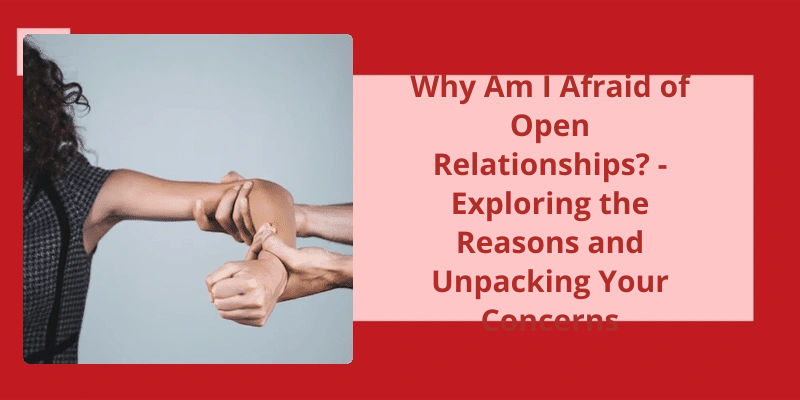For many people, the idea of an open relationship can be both intriguing and intimidating. On one hand, the thought of exploring new relationships and experiences without the constraints of monogamy may be appealing. On the other hand, the prospect of sharing one's partner with someone else can be a frightening thought. For some individuals, this fear may stem from anxieties surrounding attachment and abandonment. If you fall into this category, it's important to consider whether an open relationship is truly right for you. While it’s certainly possible to navigate these fears and make an open relationship work, it may require a level of self-awareness and communication that not everyone is ready or willing to undertake. Ultimately, the decision to pursue an open relationship should be based on your own wants and needs, rather than social or cultural pressure.
Why Don T I Want to Open Up to My Partner?
It’s a common fear, and one that’s understandable given the vulnerability of opening up and being honest about ones feelings and thoughts. This fear can be particularly strong for those who’ve experienced rejection in the past. It can be difficult to trust someone with our emotional needs, especially if we feel that we’ve been hurt or let down in the past.
Another reason why people may hesitate to open up to their partners is a fear of losing control. When we share our thoughts and feelings with someone else, we’re relinquishing a certain amount of control over how they’ll react and respond. This can be scary for some people who’re used to being in charge or who value their independence. Sharing our emotions can make us feel vulnerable and exposed, which can be unsettling, especially if we’re used to keeping our guard up.
There’s also the fear of being judged or criticized by our partner. We all have insecurities and flaws, and sometimes we worry that opening up will reveal too much and make us appear weak or flawed in our partners eyes. We may worry that our partner will see us in a negative light or judge us for our thoughts and feelings.
Along with these fears, some people may simply be uncomfortable with being vulnerable or sharing their emotions. They may feel that it isn’t their place to burden their partner with their problems or that it’s better to keep things to themselves. This tendency to avoid vulnerability can be rooted in cultural or societal values that discourage emotional expression or prioritize self-sufficiency.
Lastly, a lack of trust can also be a reason why individuals might not want to open up to their partner. Trust is a foundational aspect of any healthy relationship, and if there’s a lack of trust between partners, it can be difficult to feel safe and secure enough to share our innermost thoughts and feelings. Trust can be broken when our partner betrays our confidence, gossips about us to others, or dismisses our feelings. Once trust has been broken, it can be hard to re-establish and can make opening up even more challenging.
Fears of rejection, loss of control, judgment, discomfort with vulnerability, and lack of trust can all play a role in this hesitation. Overcoming these fears and learning to be vulnerable can be a challenging but essential part of building a healthy, fulfilling relationship. Communication, trust, and a willingness to be open and honest with one another are critical to creating a deep and lasting connection.
How to Deal With a Partner Who Is Hesitant or Resistant to Opening Up in a Relationship
- Listen to their concerns and fears without judgement.
- Try to understand their perspective and the reasons behind their hesitation.
- Encourage them to share their feelings at their own pace.
- Don’t pressure or try to force them to open up.
- Offer your own vulnerability as an example and create a safe space for them to feel comfortable sharing.
- Be patient and reassuring.
- Suggest couples therapy as a way to work through any communication issues together.
However, before jumping into an open relationship, it’s important to consider the potential challenges and complexities that come with it. It’s not a decision to be made lightly and requires a lot of communication, trust, and boundaries to make it work.
Do I Really Want an Open Relationship?
However, it’s important to consider whether an open relationship is truly right for you before pursuing it. For many individuals, the notion of non-monogamy can be appealing in theory, but in practice it can be a challenging and complex dynamic to maintain. Open relationships require a great deal of communication, trust, and a willingness to work through difficult emotions such as jealousy and insecurity.
Ultimately, the decision to pursue an open relationship should come from a place of genuine desire and a willingness to explore new possibilities. With an open mind, a commitment to honesty and transparency, and a willingness to work through challenges, an open relationship can be a fulfilling and rewarding way to explore your desires and enhance your connection with your partner.
Pros and Cons of Open Relationships
Open relationships refer to romantic and/or sexual relationships in which partners agree to engage with others outside of the primary relationship. Pros of open relationships may include increased communication and trust between partners, freedom to explore sexual and romantic desires, and decreased pressure to fulfill all needs within the primary relationship. Cons may include jealousy, potential for miscommunication and hurt feelings, and STI risks. It’s important for individuals to carefully consider their own values and boundaries before entering into an open relationship.
It’s no secret that open relationships are becoming increasingly popular, but many experts have warned about the potential risks they pose. While there are no inherent disadvantages to open relationships, some experts argue that entering into such a partnership for the wrong reasons can have serious consequences. According to relationship expert Powell, nonmonogamy can actually make existing issues within the relationship even worse. In this article, we’ll explore some of the reasons why open relationships may not be sustainable in the long run.
Why Are Open Relationships Unhealthy?
One of the most significant reasons why open relationships can be unhealthy is because of the lack of emotional security. Emotions such as jealousy and insecurity can be heightened in an open relationship because of the fear of losing the partner to someone else. This can lead to feelings of anxiety, depression, and even betrayal if one partner disregards the rules of the relationship. Moreover, when two individuals have different expectations from an open relationship, this can lead to misunderstandings and conflicts.
Another issue with open relationships is the potential for unequal power dynamics. When one partner is more enthusiastic about the idea, the other may feel pressured into agreeing to it, leading to an unequal balance of power. This can cause one partner to feel resentful and powerless, ultimately damaging the relationship. Additionally, the partner who’s more comfortable with non-monogamy may use it as a means to cheat on their partner without feeling guilty or accountable.
Although open relationships might seem appealing for some individuals, they can have long-lasting consequences. They can lead to an increased risk of sexually transmitted infections and diseases if unprotected sex takes place. Beyond the obvious physical risk, open relationships can also have a negative impact on mental health. It can lead to a lack of trust, feelings of inadequacy, and ultimately, low self-worth.
While some people may find an open relationship beneficial, it can be a slippery slope to navigate and can lead to many harmful effects on individuals and the relationship as a whole. Those who consider an open relationship should take a long look at their motivations and intentions, as well as discuss boundaries and expectations openly and honestly. Overall, it’s essential to consider the long-term impact of an open relationship on all parties involved before making any decision.
Maintaining an open relationship can be a liberating experience for some couples, but it also comes with it’s fair share of challenges. One of the biggest risks associated with having an open relationship is the potential for jealousy and insecurity to rear their ugly heads. However, there are ways to address these emotions and have a healthy and fulfilling open relationship.
What Is the Danger of Open Relationship?
It could be a conversation about what you or your partner needs to feel more secure in the relationship. Perhaps it’s just a matter of communicating more frequently or spending more quality time together. Or maybe it involves setting boundaries or rules that work for both of you and help you feel more comfortable.
Risk of Miscommunication and Confusion Another potential danger of open relationships is miscommunication and confusion. Since there are more people involved, it can be challenging to keep everyone on the same page. This can lead to misunderstandings, hurt feelings, and even conflicts. It’s important to have open and honest communication with your partner(s) and establish clear rules and boundaries.
Risk of STI and Unintended Pregnancy Open relationships also increase the risk of sexually transmitted infections and unintended pregnancy. When having sex with multiple partners, there’s a higher chance of exposure to STIs. Condoms and regular STI testing can help reduce this risk, but there’s still a chance of transmission. Unplanned pregnancies can also happen when multiple partners are involved, so it’s important to use contraception and have conversations about what’ll happen in the event of a pregnancy.
Risk of Emotional Attachment and Falling in Love While open relationships can be fulfilling and exciting, they also come with the risk of emotional attachment and falling in love with someone outside of the primary relationship. This can be a complicated and difficult situation to navigate as feelings of love and attachment can lead to jealousy and hurt feelings. It’s important for both partners to communicate openly about their feelings and establish clear boundaries to prevent any unintended emotional entanglements.
Risk of Losing the Primary Relationship Finally, the biggest danger of open relationships is the risk of losing the primary relationship. When multiple partners are involved, it’s easy for one partner to feel neglected or left out, leading to feelings of resentment and ultimately, the end of the relationship. It’s important for both partners to prioritize the primary relationship and ensure that it remains strong and healthy. This may mean dedicating specific times for one-on-one time, setting clear boundaries, and continuing to communicate openly and honestly.
How to Select Partners for an Open Relationship and Navigating Dating in This Context
- Clearly communicate your expectations and boundaries with potential partners.
- Discuss and agree upon the level of emotional involvement and frequency of contact.
- Consider the importance of transparency and honesty in all aspects of the relationship.
- Be selective in choosing partners who share similar values and goals for the relationship.
- Stay open to revisiting and renegotiating boundaries as the relationship evolves.
- Address any concerns or conflicts that arise with honesty and respect.
- Make time for self-reflection and introspection to ensure that the relationship aligns with your needs and desires.
Having an open relationship can be a challenging and complex journey. It involves a lot of trust, communication, and commitment to make it work. In this article, we will discuss some essential rules that can help ensure that your open marriage is successful and secure. These tips will guide you through the process of navigating an open relationship while maintaining a strong foundation of love and trust.
How Do You Feel Secure in an Open Relationship?
Entering into an open relationship can be a daunting task, especially when you prioritize security and stability in your romantic life. It’s important to establish clear boundaries and expectations from the beginning, as well as maintain open and honest communication throughout the duration of the relationship. It’s also essential to ensure that both partners are entering into the open relationship for the right reasons.
One of the biggest rules for a successful open marriage is to prioritize your marriage. It can be easy to get caught up in the excitement and novelty of an open relationship, but it’s important to remember that your primary focus should always be your relationship with your partner. This means maintaining open lines of communication, prioritizing quality time together, and making sure your partner always feels appreciated and valued.
Jealousy can be a major hurdle in any relationship, but it can be particularly challenging in an open one. It’s important to address any feelings of jealousy as soon as they arise, rather than letting them fester and grow. This may involve setting boundaries around certain activities or partners, or exploring the root of the jealousy and working together to find a solution.
Safe sex is also an important consideration in any open relationship. It’s important to discuss and agree upon safe sex practices with any partners outside of the relationship, and to communicate openly about any potential risks or concerns.
Open and honest communication is key in any successful relationship, but it’s particularly essential in an open one. This means being forthcoming about your wants and needs, as well as your likes and dislikes, and being willing to listen and compromise when necessary.
Finally, it’s important to agree on how you’ll explain your situation to outsiders, particularly friends and family who may not be familiar with the concept of an open relationship. This may involve establishing clear boundaries around public displays of affection or establishing a code word or phrase to indicate when you don’t want to discuss your relationship further.
Maintaining a Healthy Emotional and Physical Balance Between Multiple Partners
- Communicate openly and honestly with all partners
- Set boundaries and respect each other’s boundaries
- Take responsibility for your own emotions and actions
- Practice safe sex and get regular testing for STIs
- Nurture and prioritize each relationship regularly
- Be mindful of jealousy and address it when it arises
- Seek therapy or counseling as needed
- Regularly check in with yourself and each partner about the state of the relationships
- Take breaks or establish solo time as needed to avoid burnout
Conclusion
In conclusion, the fear of open relationships is a complex issue that must be approached with honesty and understanding. Anyone who’s considering an open relationship must first examine their attachment style and recognize their insecurities. While an open relationship can be rewarding, it may trigger fear of abandonment and other anxieties. It’s important to communicate with your partner and work towards building trust and security within the relationship.






